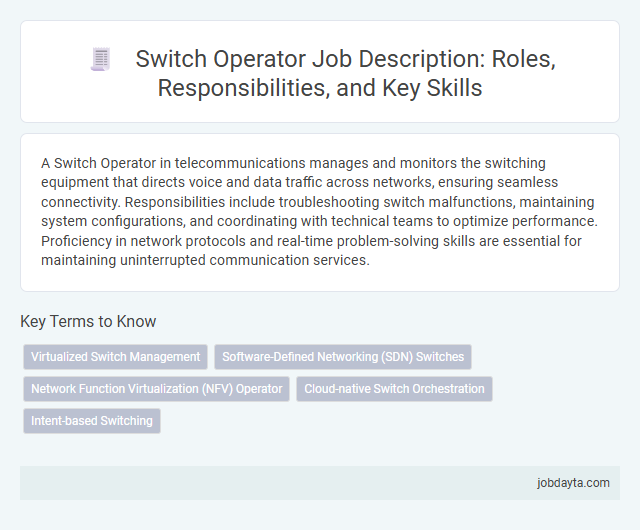A Switch Operator in telecommunications manages and monitors the switching equipment that directs voice and data traffic across networks, ensuring seamless connectivity. Responsibilities include troubleshooting switch malfunctions, maintaining system configurations, and coordinating with technical teams to optimize performance. Proficiency in network protocols and real-time problem-solving skills are essential for maintaining uninterrupted communication services.
Overview of a Switch Operator in Telecommunications
What is the role of a switch operator in telecommunications? A switch operator manages and controls the switching equipment that routes calls and data across telecommunication networks. Your ability to ensure seamless connectivity directly impacts the efficiency and reliability of communication services.
Core Roles and Responsibilities of a Switch Operator
Switch Operators play a crucial role in the telecommunications infrastructure by managing and maintaining network switches that direct data traffic. Your expertise ensures seamless communication and minimizes service disruptions across the network.
- Network Traffic Management - Control and route data packets efficiently to maintain optimal network performance.
- System Monitoring - Continuously observe switch operations to detect and resolve faults quickly.
- Maintenance and Configuration - Perform regular updates and adjustments to switch hardware and software for reliability and security.
Essential Technical Skills for Switch Operators
Switch operators must possess strong knowledge of telecommunication systems, including circuit switching and packet switching technologies. Proficiency in troubleshooting hardware and software issues is critical to maintain seamless network connectivity. Familiarity with signaling protocols such as SS7 and ISDN ensures efficient call routing and system performance.
Daily Tasks and Workflow Management
Switch operators play a critical role in managing telecommunication networks by controlling the connections between calls. Your efficiency directly impacts the quality and reliability of voice and data transmission.
- Call Routing Management - Switch operators monitor and configure routing paths to ensure uninterrupted call connectivity across the network.
- Equipment Monitoring - Continuous supervision of switching equipment is essential to detect faults and maintain optimal operational status.
- Workflow Coordination - Managing daily tasks involves coordinating with network engineers and technicians to resolve issues and implement upgrades promptly.
Importance of Switch Operators in Network Infrastructure
Switch operators play a crucial role in managing the flow of data within telecommunication networks. They ensure efficient connectivity and seamless communication between different network nodes.
By controlling packet switching and routing, switch operators maintain network stability and optimize traffic distribution. Their expertise minimizes latency and prevents data congestion, which is vital for high-speed internet and reliable voice services. Effective switch operation supports the backbone of modern telecommunication infrastructure, enabling uninterrupted data exchange across global networks.
Required Certifications and Educational Background
Switch operators in telecommunication manage the connection and routing of phone calls through switching systems. They ensure efficient signal transmission and maintain communication network quality.
Required certifications for switch operators often include industry-recognized credentials like the Certified Telecommunications Network Specialist (CTNS) or CompTIA Network+. A strong educational background typically involves a high school diploma or associate degree in telecommunications or related fields.
Troubleshooting and Problem-Solving Techniques
Switch operators play a crucial role in managing telecommunication networks by ensuring seamless connection routing and signal integrity. Troubleshooting techniques involve diagnosing hardware faults, configuration errors, and network congestion to maintain optimal system performance. Your ability to quickly identify and resolve these issues minimizes downtime and enhances communication reliability.
Communication and Coordination in Switch Operations
Switch operators play a critical role in maintaining efficient communication networks. Their coordination ensures seamless connectivity and minimizes downtime during switch operations.
- Real-time Signal Management - Switch operators monitor and control signal routing to maintain proper communication flow.
- Incident Coordination - They collaborate with technical teams to quickly resolve operational issues and restore service.
- Network Status Reporting - Operators provide accurate updates on switch functionality to support informed decision-making.
You rely on switch operators to uphold the integrity and reliability of communication infrastructure.
Safety Protocols and Compliance Standards
| Role | Switch Operator in Telecommunication |
|---|---|
| Core Responsibility | Managing and controlling telecommunication switching systems for efficient call routing and network connectivity |
| Safety Protocols |
|
| Compliance Standards |
|
| Importance | Ensures uninterrupted network services, protects personnel from hazards, and maintains regulatory compliance critical to telecommunication infrastructure reliability |
Career Growth and Advancement Opportunities for Switch Operators
Switch operators play a crucial role in telecommunication by managing and directing telephone calls through switching systems. Their expertise in operating complex equipment forms the foundation for efficient communication networks.
Career growth for switch operators often leads to supervisory or technical specialist roles within telecommunications companies. Opportunities for advancement include training in network management, system maintenance, and emerging communication technologies.
Related Important Terms
Virtualized Switch Management
Virtualized Switch Management enhances network efficiency by enabling centralized control and automation of switch operations within a software-defined infrastructure. This approach improves scalability, reduces operational costs, and ensures seamless integration with cloud and edge computing environments.
Software-Defined Networking (SDN) Switches
Software-Defined Networking (SDN) switches enable centralized control and dynamic configuration of network traffic by separating the control plane from the data plane, enhancing flexibility and scalability in telecommunication networks. These switches facilitate seamless integration with network management software, optimizing routing, load balancing, and network automation for improved operational efficiency.
Network Function Virtualization (NFV) Operator
Switch Operators leveraging Network Function Virtualization (NFV) enable dynamic deployment and management of network services through virtualized infrastructure, significantly reducing operational costs and enhancing scalability. By virtualizing core network functions, NFV Operators optimize resource allocation, improve service agility, and accelerate time-to-market for new telecommunication offerings.
Cloud-native Switch Orchestration
Cloud-native switch orchestration enables seamless management and automation of telecommunication networks through scalable, containerized microservices deployed on cloud infrastructure. This approach enhances real-time switching efficiency, reduces operational costs, and supports dynamic service provisioning in next-generation telecom environments.
Intent-based Switching
Intent-based Switching enhances network efficiency by automating decision-making processes based on high-level business policies and user intent rather than manual configurations. Switch operators leverage this technology to dynamically optimize traffic flow, reduce latency, and improve overall network reliability in modern telecommunication systems.
Switch Operator Infographic

 jobdayta.com
jobdayta.com